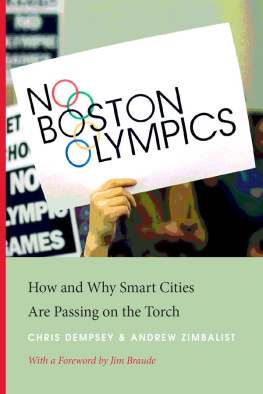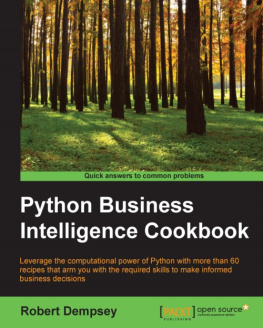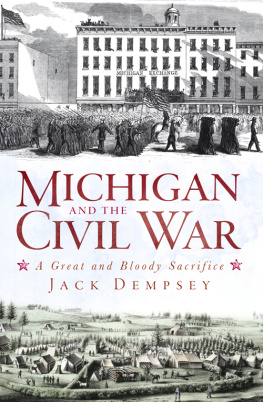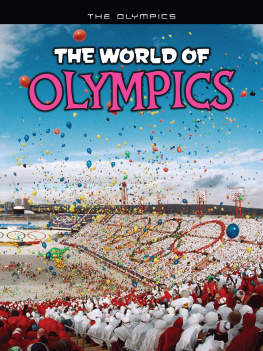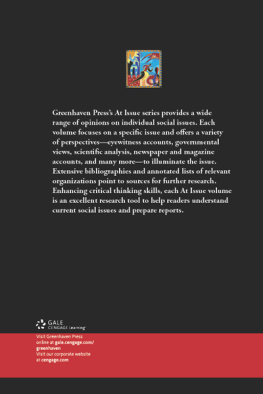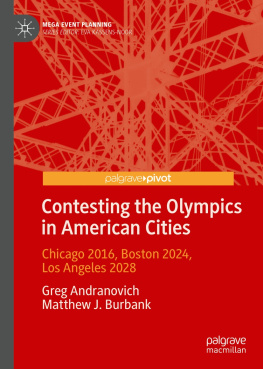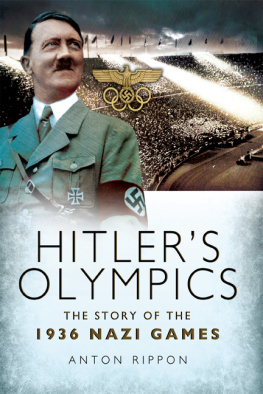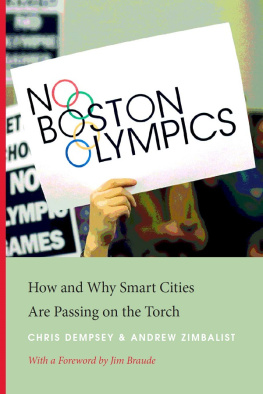DEMPSEY - NO BOSTON OLYMPICS: how and why smart cities are passing on the torch
Here you can read online DEMPSEY - NO BOSTON OLYMPICS: how and why smart cities are passing on the torch full text of the book (entire story) in english for free. Download pdf and epub, get meaning, cover and reviews about this ebook. year: 2017, publisher: University Press of New England;Foredge, genre: Politics. Description of the work, (preface) as well as reviews are available. Best literature library LitArk.com created for fans of good reading and offers a wide selection of genres:
Romance novel
Science fiction
Adventure
Detective
Science
History
Home and family
Prose
Art
Politics
Computer
Non-fiction
Religion
Business
Children
Humor
Choose a favorite category and find really read worthwhile books. Enjoy immersion in the world of imagination, feel the emotions of the characters or learn something new for yourself, make an fascinating discovery.
NO BOSTON OLYMPICS: how and why smart cities are passing on the torch: summary, description and annotation
We offer to read an annotation, description, summary or preface (depends on what the author of the book "NO BOSTON OLYMPICS: how and why smart cities are passing on the torch" wrote himself). If you haven't found the necessary information about the book — write in the comments, we will try to find it.
A play-by-play account of how No Boston Olympics rallied Massachusetts residents to reject an Olympic bid
DEMPSEY: author's other books
Who wrote NO BOSTON OLYMPICS: how and why smart cities are passing on the torch? Find out the surname, the name of the author of the book and a list of all author's works by series.
NO BOSTON OLYMPICS: how and why smart cities are passing on the torch — read online for free the complete book (whole text) full work
Below is the text of the book, divided by pages. System saving the place of the last page read, allows you to conveniently read the book "NO BOSTON OLYMPICS: how and why smart cities are passing on the torch" online for free, without having to search again every time where you left off. Put a bookmark, and you can go to the page where you finished reading at any time.
Font size:
Interval:
Bookmark:

ACKNOWLEDGMENTS
Kelley Gossett and Liam Kerr, my fellow volunteer cochairs, were the heart and soul of No Boston Olympics. None of what we did as an organization would have been possible without their generosity, strength, intelligence, and fierce commitment. I am honored to call them friends and fortunate to have had them fighting alongside me.
No Boston Olympics was a true grassroots organization, fueled by the efforts of hundreds of volunteers and contributors. I am grateful for every small-dollar contribution, letter to the editor, homemade sign, and tweet. Special thanks are due to our guardian angels Diana and Lee Humphrey, young gun Aaron Leibowitz, the sage Ray Howell, and JP dad Seth Kroll. Thanks also to supporters Joe Blair, Victor de Fontnouvelle, Charley Lax, Joe Huber, Noah McCormack, Mike Casella, Diane Simpson, and Robert Gifford.
Thank you to Massachusetts Representatives Bill Straus, Aaron Michlewitz, and Mike Moran for their support and friendship.
Jonathan Cohn and Robin Jacks of No Boston 2024 were allies who became friendsand even editors of sections of this book!
Thank you to Victor Matheson and David Luberoff, for introducing me to Professor Zimbalist and for their encouragement in the early days of No Boston Olympics.
My parents taught me the value and importance of civic engagement. They are my role models. I am grateful for their love, support, and encouragement, even though I dont tell them that enough!
Finally, my girlfriend, Anna Cilluffo, was patient and caring through many months in which Boston 2024 (and writing this book) consumed my life. Her love and affection helped me make it through.
Chris Dempsey
Thanks to Ted Cartselos, Bill Straus, Jrgen Bruns-Berentelg, Joachim Thiel, Elizabeth Warren, Jim Braude, Eric Garcetti, Evan Falchuk, Manav Kumar, Derek Shearer, Chuck Collins, Art MacEwan, Liam Kerr, Kelley Gossett, Theresa Williamson, Victor Matheson, Rob Baade, Wolfgang Maennig, Julianna Barbassa, Chris Gaffney, Janice Forsyth, Dan Gardner, Brad Humphreys, Casey Wasserman, Jeff Millman, Laura Robinson, Judith Grant Long, and, with love, to Shelley, Alex, Ella, Jeff and Mike.
Andrew Zimbalist
ONE
CITIUS, ALTIUS, FORTIUS
Faster, higher, stronger. The Dominican priest Henri Didon, one of the great French preachers of the late nineteenth century, kicked off a scholastic athletic competition in France with these words in 1891.
Coubertin also had a passion for ancient Greece; he saw the ancient Greeks famed Olympic Games as the quintessential intersection of civilization and athletics. By the time he heard Father Didons three-word phrase, which would become the Olympic motto, Coubertin was well on his way to reviving the ancient Olympic Games for the modern era. In June 1894, Coubertin organized the Congress on the Revival of the Olympic Games at the Sorbonne in Paris, which led to the creation of the International Olympic Committee. A Greek businessperson living in Paris, Demetrius Vikelas, became the IOCs first president. Coubertin became the organizations secretary general. The committees central charge was to organize the first modern Olympic Games, to be held in Athens in 1896.
The 1896 Games shared the fate of many of its successors: they were beset by cost overruns, the construction of otherwise unneeded facilities, and logistical failures. A Greek diplomat and early member of the IOC, Stephanos Skouloudis, filed a report that concluded that the budget had soared to more than three times Coubertins initial cost estimates. The cost of the Panathenaic Stadium, the signature venue, had risen from 585,000 to 920,000 drachmas.
But the Games went on. A Bostonian, James Connolly, was awarded the very first Olympic medal, for winning the triple jump (then known as the hop, skip and jump).
At the conclusion of the 1896 Games, King George I of Greece pleaded with the International Olympic Committee to make Athens the permanent home of the modern Olympics. After all, the country had just built all the stadiums and venues needed to play hostit made practical sense to reuse them in the future.
Perhaps Coubertins plan had some merit in an era before radio, television, the Internet, or air travel. Maybe in the 1890s it made sense to move the Games around, even if that did require the wasteful construction of new facilities that often lacked a legitimate long-term use. But since that time, the Olympics have become a blockbuster television eventfor every individual watching the Olympics in a stadium, hundreds of thousands more do so on a screen. Billions of people can now enjoy the events in real time no matter where the competitions might be held. Today, unlike in 1896, those who want to experience the competitions in person can hop on a plane. No weeks-long ocean voyage is needed. A century of technological innovation has made Coubertins business model antiquated.
Yet the International Olympic Committee, buoyed by its unregulated, worldwide monopoly of the Games, has clung to the only approach it has ever known. And why wouldnt it? The roughly one hundred IOC members, hailing from countries large and small around the world, are in an enviable position. But there is no evidence that the IOC has modified them for future hosts.
And the costs associated with pampering IOC members pale in comparison to the IOCs requirements for shiny new sporting venues, a gleaming media and press center, and an Olympic village that can host more than ten thousand athletes and five thousand coaches and trainers at the Summer Games. Most important, the IOC requires host cities to provide a financial backstop for all construction and operations associated with the Games. If things dont go according to plan, it is the host government, not the IOC, that must pay for the cost overrunsjust as it was in Athens in 1896.
The IOC can perpetuate this system because every two years bidding committees in at least a handful of cities decide they want a shot at Olympic glory. The idea of seeing ones own city stand proudly on the world stage as an Olympic host holds obvious allure. The opportunity often proves particularly compelling to those in the business of construction, real estate development, investment banking, hospitality, or insurance. After all, well-connected firms and individuals in these industries stand to benefit greatly from the billions of dollars of spending required of Olympic hosts. Local bidding committees convince themselves that the Games will deliver vast and incalculable benefits for themselves and for their communities. The IOC then plays these overeager bidding committees off one another and extracts ever-more-lavish concessions, proposals, and promises from prospective hosts.
Of course, even monopolists can run afoul of their consumers by pushing their advantage too far. This happened to the IOC in the 1970s. Denver, the capital city of Colorado, had won the right to host the 1976 Winter Games. But the organizing committee lacked transparency and had failed to consult with the Denver City Council on its plans. Olympic skeptics pushed for a referendum in November 1972 that would bar public funds from being used on the Games. Despite being outspent by a 7.3 to 1 margin, the opposition easily defeated the Olympic bid by a 60/40 vote. Colorados citizens had decided that the financial cost and potential environmental damage of hosting were not worth it.
The success of Los Angeles was enough to turn the tide for the IOCs standing, and from 1984 to the early 2000s, the committee enjoyed crowded fields of bidders for its Games. Thanks to more competition among the worlds cities, the IOC was able to extract promises of more and more elaborate venues and accommodations. Eventually, as hosting costs rose above $5 billion, then $10 billion, then $20 billion, the bubble burst again. Beginning in the early 2000s, the number of cities bidding began to fall, leading to a veritable crash of bidders for the 2022 Winter Games during 2013 and 2014.
Next pageFont size:
Interval:
Bookmark:
Similar books «NO BOSTON OLYMPICS: how and why smart cities are passing on the torch»
Look at similar books to NO BOSTON OLYMPICS: how and why smart cities are passing on the torch. We have selected literature similar in name and meaning in the hope of providing readers with more options to find new, interesting, not yet read works.
Discussion, reviews of the book NO BOSTON OLYMPICS: how and why smart cities are passing on the torch and just readers' own opinions. Leave your comments, write what you think about the work, its meaning or the main characters. Specify what exactly you liked and what you didn't like, and why you think so.

